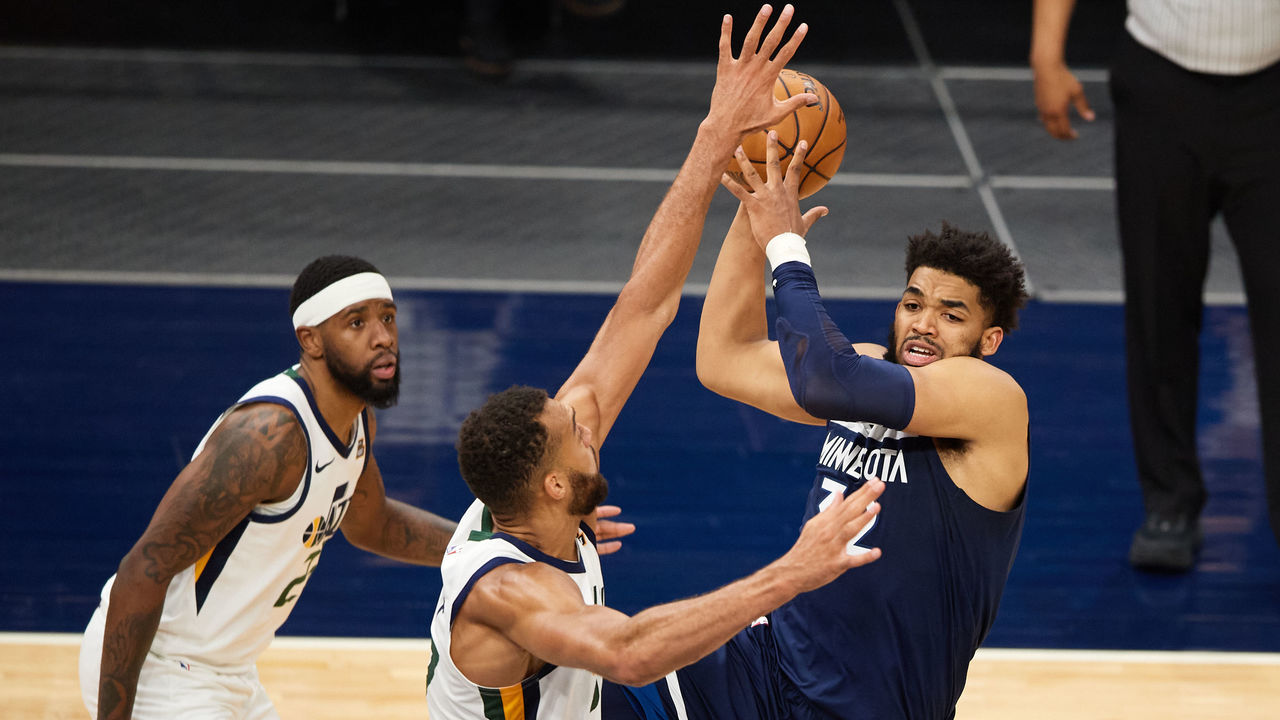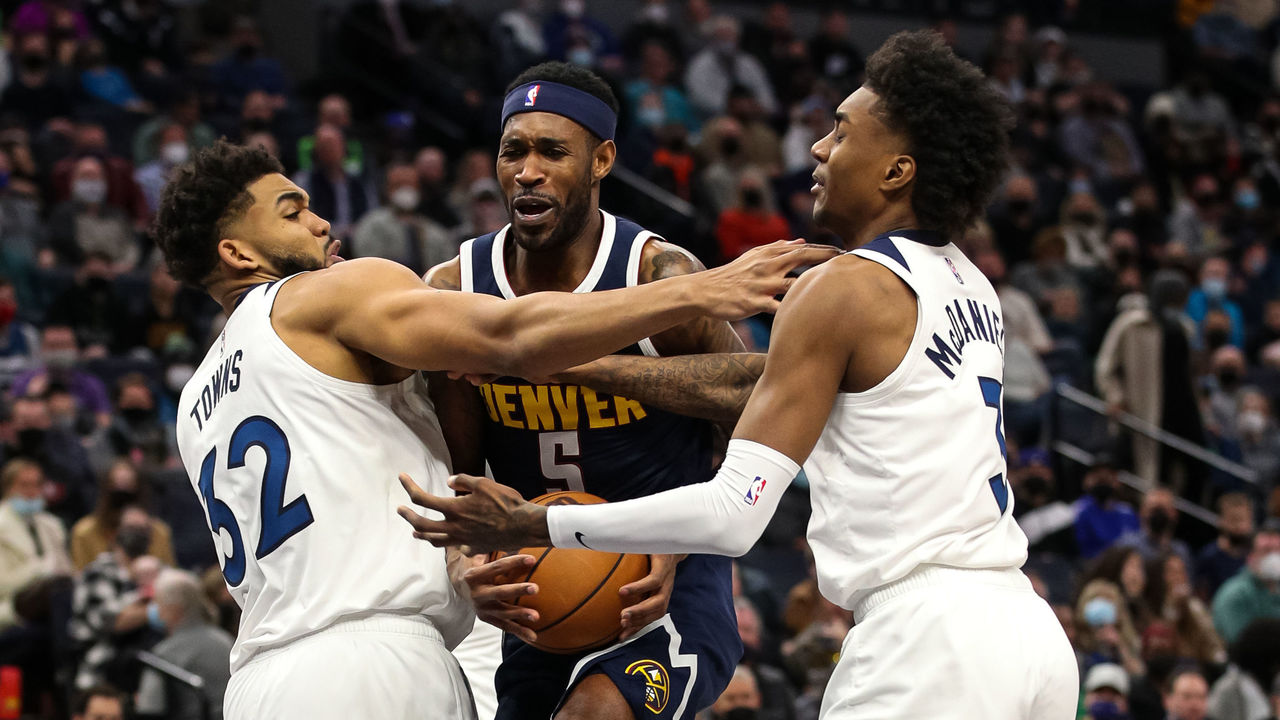Why the T-Wolves paid out the nose to join the twin-big renaissance
The NBA is in a constant state of stylistic flux. For over a decade, the league has favored perimeter play and defensive switchability, which has naturally corresponded with smaller frontcourts. Although the small-ball trend continues apace, teams are increasingly willing to cut against the grain and go with two-big lineups.
The upstart Grizzlies had a ton of success playing Jaren Jackson Jr. and Steven Adams together last season. So did the surprising Cavaliers with Evan Mobley and Jarrett Allen. The Pelicans turned their defense around in part by sliding Jaxson Hayes to the four alongside Jonas Valanciunas. Robert Williams III and Al Horford aren't quite in the same height class as those other guys, but they're both functionally big men, and they started together for the Eastern Conference-winning Celtics.
After several years of playing Karl-Anthony Towns at center, the Minnesota Timberwolves are diving headlong into the twin-big revival. They officially bumped Towns down to the power forward spot Friday by sending a massive bundle of players and draft picks to the Utah Jazz in exchange for Rudy Gobert, pairing one of the best offensive bigs with the best defensive big in the league. It's a fascinating gambit, and all it cost them was (deep breath): Malik Beasley, Jarred Vanderbilt, Patrick Beverley, and Leandro Bolmaro; this year's first-round pick, Walker Kessler; unprotected first-round picks in 2023, 2025, and 2027; a first-round swap in 2026; and a top-five protected pick in 2029.
So, what compelled a young Wolves team coming off a feel-good season to shell out this much future equity in order to add a guy at a position that was ostensibly already filled? Let's break it down.

The benefits and drawbacks of sizing up are pretty well-established at this point: doing so typically bolsters a team's defense and rebounding while hindering its offense, though it doesn't work that way for every team. (The Grizzlies, for instance, reaped the benefits of the Adams-Jackson pairing primarily at the offensive end.) What makes Gobert such a theoretically good fit for the Wolves is that he stands to help them on both sides of the ball.
That the three-time Defensive Player of the Year will improve his new team's defense should go without saying. Minnesota has long been one of the worst rim-protecting teams in the league, due in large part to Towns' limitations on that front. This past season, recognizing the futility of using Towns in a drop, coach Chris Finch completely overhauled the Wolves' scheme, having them overload the strong side and bringing Towns up to the level of the screen in pick-and-roll coverage while showing far more aggressive help in the middle of the floor.
That philosophical shift worked - Minnesota led the league in forced turnovers and finished 13th in defensive efficiency, after ranking no higher than 20th in any other season of Towns' career - but the aggressiveness still came at a cost. The Wolves committed shooting fouls at the league's highest rate, ranked 27th in defensive rebounding percentage, and surrendered the second-highest frequency of corner threes, all while remaining bottom 10 in field-goal percentage allowed at the rim.
Gobert is going to help immensely with all of that. He blots out the rim, inhales rebounds, and negates the need to engage a third defender in pick-and-roll because of his ability to play the ball and the roller at the same time. His Jazz teams were consistently among the league's best at suppressing both shots at the rim and from 3-point range, the latter enabled by Utah's perimeter defenders being able to stay home and chase opponents off the arc knowing they had the world's sturdiest safety net behind them. His arrival doesn't mean the Wolves have to scrap every element of their frenzied scheme, but he'll allow them to scale it back a bit and deploy their aggressiveness more selectively.

Minnesota was boxed into playing a particular style last season, and while that style was largely successful, defensive versatility is the name of the game right now. As the league's two-big teams have shown, putting more size on the floor tends to make defenses more flexible. Having Towns chase opposing stretch-fours around may not seem ideal, but it's no worse than having him be the Wolves' last line of defense. Now when teams attack him in pick-and-roll, they're still going to have to deal with Gobert at the second or third level. And while playing two 7-footers together can slow a team down and leave it vulnerable to smaller units that push the tempo, Towns spends so much time spotting up at the top of the floor that he's usually in good position to retreat and defend in transition.
Part of the reason the Wolves were willing to give up so much draft compensation is that it allowed them to hang onto their core young players, namely 21-year-old defensive stalwart Jaden McDaniels. Losing Vanderbilt and Beverley hurts the perimeter defense, but between Gobert, McDaniels, and free-agent signee Kyle Anderson, they have a ton of length, help capability, and supplemental rim protection to insulate Towns and D'Angelo Russell. If Anthony Edwards can take another step forward, this should be a top-10 defense.
Gobert is obviously a limited player at the other end of the floor, but the Wolves' offense is still going to benefit from his roll gravity and above-the-rim finishing, something they glaringly lacked from their bigs last season.
Rudy Gobert converted on 95 alley-oops last season
— mathketball (@Mathketball1) July 1, 2022
The Wolves' 2 highest usage roll-men last season, KAT and Naz Reid, converted on 5 alley-oops... COMBINED
Slotting the best shooting big man in the league next to one of its best dive men will go a long way toward mitigating the spacing issues that tend to come with playing two bigs together. The Wolves can run double ball screens or Horns action with Gobert rolling and Towns popping, or simply run pick-and-roll with Gobert while Towns spaces the floor above the break. They could even get really funky and run some Towns-Gobert pick-and-roll. They'll essentially get the defensive benefits of two bigs with little to none of the offensive downside.
At first blush, you might think moving Towns down the positional spectrum negates a huge advantage on offense, but his limitations on defense meant the Wolves rarely got the benefit of 5-out spacing even with him playing center. They needed to insulate him with defensive specialists, most of whom couldn't shoot or do much of anything on offense, and opposing centers took to simply guarding those players and roaming to their hearts' delight. (That approach, incidentally, was popularized by Gobert and the Jazz.) In other words, Towns was already being guarded by power forwards, so this doesn't change much in that regard. It just means replacing Vanderbilt with an actual lob threat in the dunker spot.
Gobert's excellent screening and consistently hard rolling should also make piloting the offense easier for Russell. Edwards' playmaking and in-between game still have a long way to go, which is why the pop-happy Towns remains a much better two-man dance partner for him. But Russell is an excellent passer with a buttery floater, and he's going to get more opportunities to showcase those skills (lob and skip passing in particular) by linking up with Gobert in the pick-and-roll.
This was still a ton for Minnesota to give up, and there's no guarantee the move pushes it beyond (or even into) second-round territory in the perpetually unforgiving West. It's always a huge risk for a low-rung playoff team to go all-in to try and climb the ladder, especially when that all-in move involves a 30-year-old on a gargantuan contract. There are good risks and bad risks, and how this one is classified is in the eye of the beholder. It depends on how one weighs the value of Gobert's rim protection against his other limitations, or the benefits of two-big lineups against the success and continuing encroachment of small ball.
Minnesota president of basketball operations Tim Connelly and Co. made it clear where they stand on those questions, and they staked a whole lot of the Wolves' future on their convictions. We'll see if their boldness is rewarded.